- Army
- Air Defense Systems
- Anti-tank systems and vehicles
- Armored Vehicles
- Armoured personnel carriers
- Artillery Vehicles and Weapons
- Command Post
- Communication Vehicles and Systems
- Electronic Warfare
- Engineer | Maintenance Vehicles
- Infantry Fighting Vehicles
- Main Battle Tanks
- Missiles
- Tactical and Logistic Vehicles
- Radars
- Unmanned Systems
- Weapons
- Navy
- Air
BTR-4E Bucephalus
BTR-4E Bucephalus
8x8 wheeled combat APC Armoured Personnel Carrier IFV vehicle - Ukraine
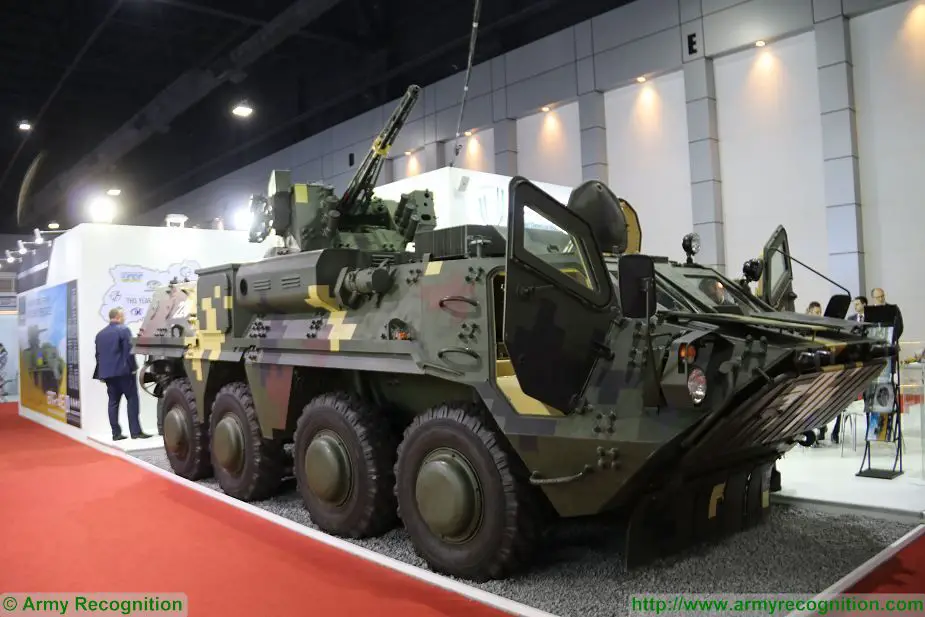
Description
The BTR-4E also nicknamed Bucephalus is the export version of the BTR-4, an 8x8 armored vehicle personnel carrier (APC) designed by the Ukrainian Company Kharkiv Morozov Machine Building Design Bureau. This is the latest generation of wheeled armored personnel carriers (APC) manufactured by the Ukrainian defense industry. This is a new development of an 8x8 armored vehicle that is not based on Russian technology of wheeled combat vehicles as the BTR-80 family. The BTR-4E APC is designed to be used as a personnel carrier vehicle for infantry units or as a wheeled infantry fighting vehicle with a weapon station to provide fire support. It can be operated under various climatic conditions from a temperature range of -40° to +55°C. In July 2012, Ukrainian Defense Ministry has announced the delivery of the first BTR-4E APC for its armed forces. The BTR-4E is already in mass production and is in service with Ukraine, and Iraq. On December 24, 2019, the Ukrainian army has taken the delivery of 12 BTR-4E 8x8 APCs. In May 2020, the Kharkiv-based Morozov Design Bureau of Engineering, which is part of the Ukroboronprom group of companies, transferred to the Ukrainian Ministry of Defense another batch of five BTR-4E armored personnel carriers. In 2014, Ukraine has delivered 10 BTR-4E to Nigeria.
BTR-4E variants:
No variants at this time.
Technical Data
| Armament |
|
The BTR-4E Bucephalus can be fitted with different types of weapon stations, but the standard version is fitted with a remotely operated weapon station called BM-3 Shturm which is armed with one ZTM-1 30mm automatic cannon. The second armament of the turret includes one KT or PKT 7.62mm machine gun, and one AG-17 30mm automatic grenade launcher mounted to the left side of the main armament. Two launchers for the Anti-Tank Guided Missile (ATGM) Barrier are fitted to the right side of the turret. The Barrier missile uses a semi-automatic laser beam guidance system. The warhead of the Barrier missile can penetrate ERA (Explosive Reactive Armour) up to 800mm. It can hit a target from a distance of 100 to 5,000m. The turret is operated by the gunner from inside of the hull, on a seat located on the right side of the troop's compartment. The commander of the vehicle can take control of all the weapons of the turret, thanks to its individual screen and a joystick located at the front of its seat. Mounted on either side of the main armament is a bank of three electrically operated smoke grenade launchers. The BTR-4E can be fitted with the weapon stations BM-7 Parus, BM Grom, and BAU 23-2.
|
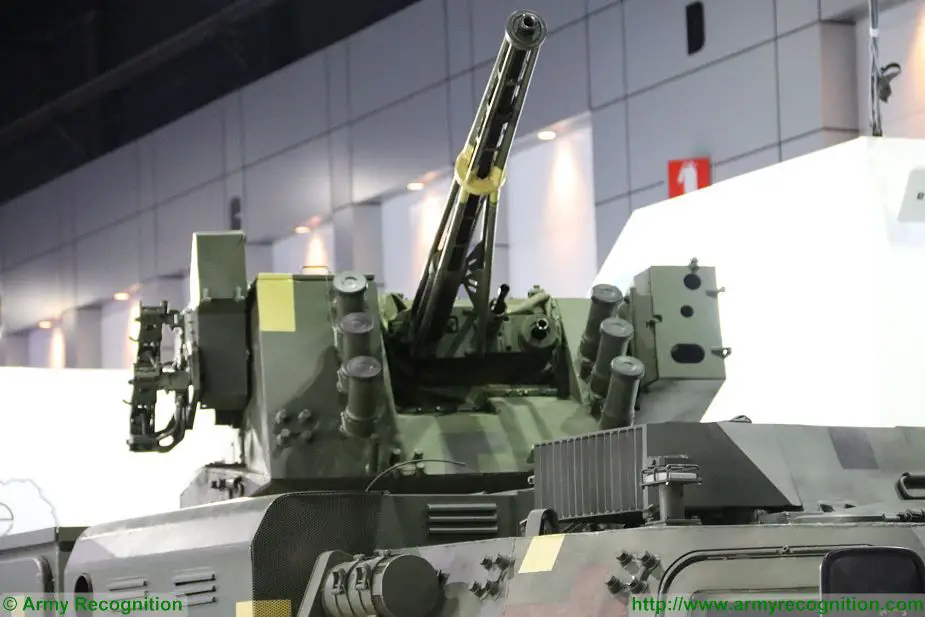 Close view of BM-3 Shturm weapon station of BTR-4E Close view of BM-3 Shturm weapon station of BTR-4E |
| Design and protection |
|
The design of the BTR-4E Bucephalus is divided into three compartments with driver and commander seats at the front, engine and transmission in the middle, and troops compartment at the rear. The vehicle has a crew of three and seven infantrymen that can be carried at the rear of the vehicle. The infantrymen enter and leave the BTR-4E via a double door at the rear of the hull, which opens outwards. The right door is fitted with a single firing port. Each soldier has an individual seat facing inwards, with four seats mounted on each side of the hull. Each rear part of the side hull is equipped with three firing ports and day vision devices mounted on the roof. The driver sits at the front of the vehicle on the left with the commander to his right. Both crew members have a side door that opens to the front, with a bulletproof window in its upper part hinged at the top. The commander and gunner have a single-piece hatch on the roof of the vehicle that opens to the front. Both the commander and driver have also a bulletproof window to their front which is covered in combat by an armored plate cover hinged at the top. The BTR-4E hull is protected against the firing of small arms 7.62mm AP (Armour Piercing) caliber and artillery shell splinters, Level 2 STANAG 4569. The BTR-4E is also equipped with an anti-mine "skirt" which improves protection against mine blasts and IEDs (Improvised Explosive Devices). To increase the protection of the vehicle, the turret and the sides can be fitted with slat armor to provide a higher level of protection against attack by rocket-propelled grenades and other weapons fitted with a HEAT warhead. There is also an add-on armor kit available that can provide all-around protection against weapons of 30mm caliber.
|
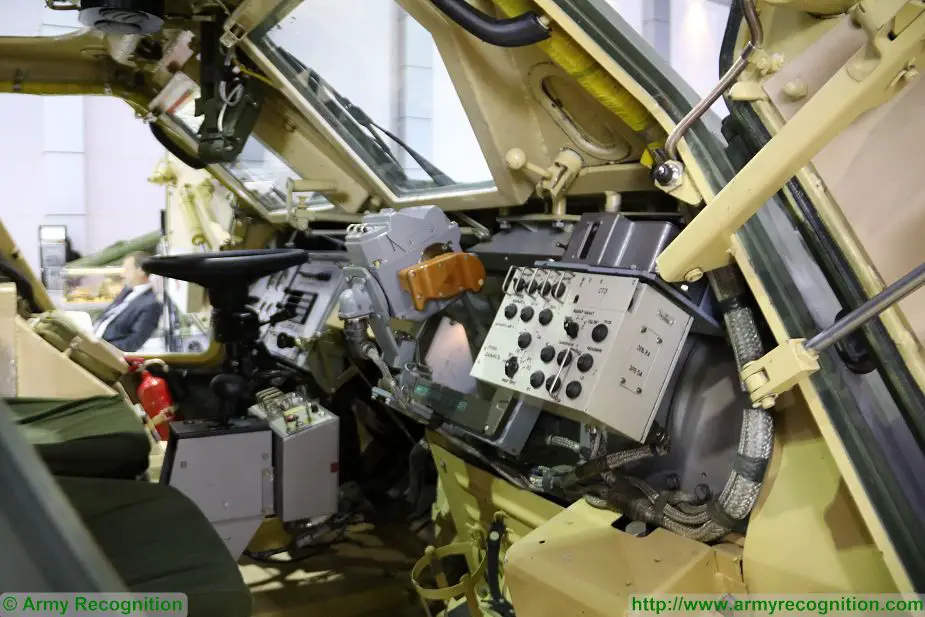 The commander of the vehicle can take control of all the weapons of the turret, thanks to its individual screen and a joystick located at the front of its seat. |
| Mobility |
| The BTR-4E Bucephalus is motorized with a Deutz EBPO III engine developing 500 or 600 hp. coupled to a gearbox with 5 forward and 1 reverse gear. It uses an 8x8 chassis with independent suspension, automatic transmission, and hydro-mechanical with pass-through axles. It can run at a maximum road speed of 110 km/h with a maximum cruising range of 700 km. The vehicle is able to climb a gradient of 60% and a side slope of 40%. It can cross a vertical obstacle of 0.6m and a trench of 2m. |
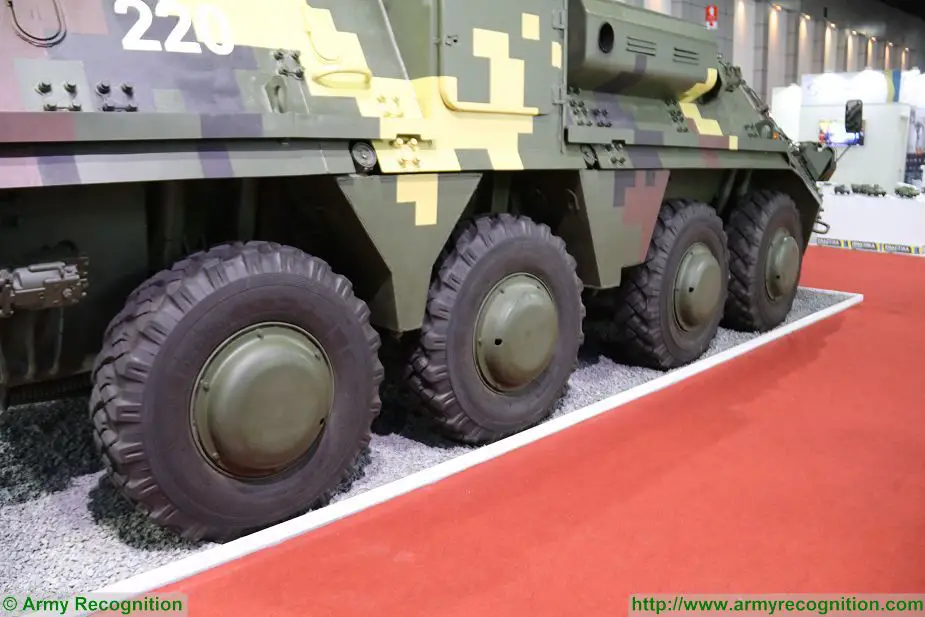 The BTR-4E is based on an 8x8 chassis with independent suspension |
| Accessories |
| Standard equipment of BTR-4E Bucephalusincludes a heater, night vision, automatic fire suppression, a central tire inflation system, a winch with a maximum capacity of 9 tones, and NBC (nuclear, biological, and chemical) protection systems. The driver is equipped with one white lamp and an infrared lamp located on the left side of its front window. There is an Auxiliary Power Unit (APU) in a storage box mounted in the middle of the right side hull which is used to power the weapon station when the main engine is stopped. The vehicle is also equipped with a navigation system SN-3003E Bazal satellite system with an antenna located near the hatch of the commander. The BTR-4 is fully amphibious and can cross water obstacles at a maximum speed of 10 km/h thanks to two propellers mounted at the rear of the hull. The vehicle is able to perform sea operations at Sea State 3 with waves up to 1.25m. Before entering the water a trim vane is erected at the bottom front of the vehicle. An air intake expansion pipe is mounted on the left side of the vehicle which can be fitted on the engine outlet when the waves are over 0.5m. |
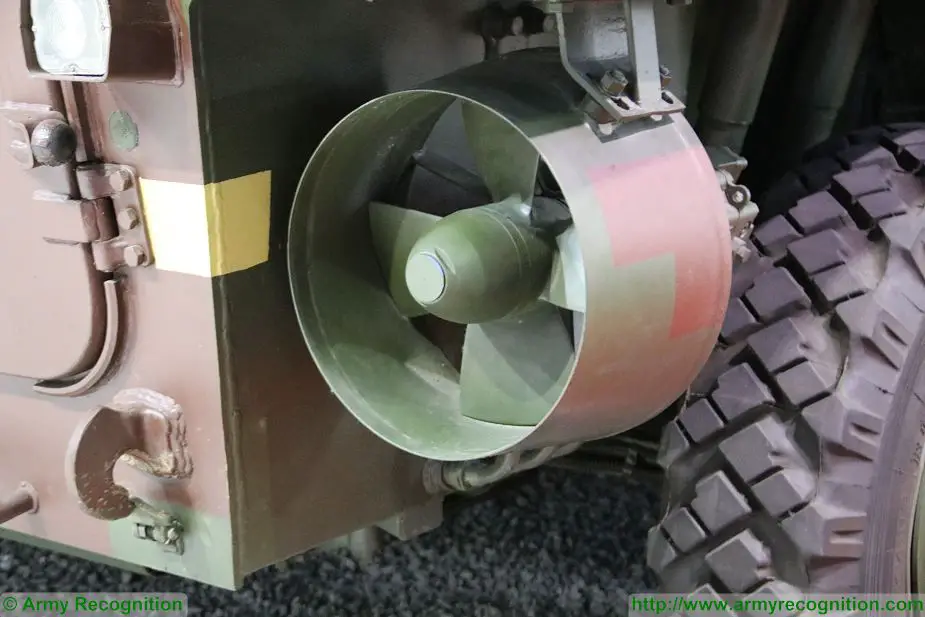 The BTR-4E is fully amphibious propelled in the water by propellers mounted at the rear of the hull. |
Specifications
| Armament | Armor |
| One 30mm automatic cannon, one 7.62mm coaxial machine gun, one 30mm automatic grenade launcher, and two launchers for anti-tank guided missile | Standard protection against firing of small arms and artillery shell splinters. Slat armor and add-on armor kit for protection against 30mm caliber weapons. |
| Country users | Weight |
| Ukraine, Iraq, Nigeria | 22,400 kg |
| Designer Country | Speed |
| Ukraine | 110 km/h |
| Accessories | Range |
| heater, night vision, automatic fire suppression, a central tire inflation system, a winch with a maximum capacity of 9 tones and NBC (nuclear, biological and chemical) protection systems. | 700 km |
| Crew | Dimensions |
| 3 + 7 | Length: 7.87 m; Width: 2.96 m; Height: 3.05 m |
Details View
 |
|
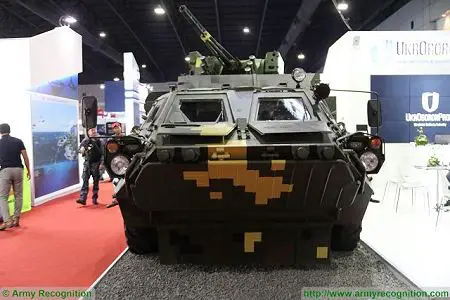 |
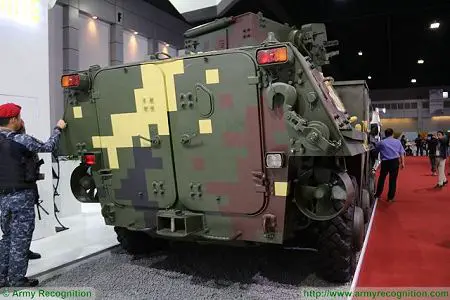 |
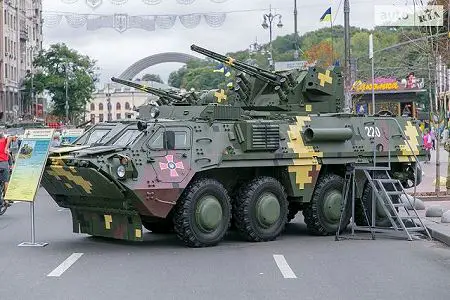 |
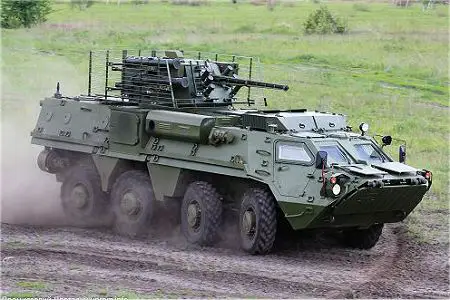 |
Pictures - Video



























